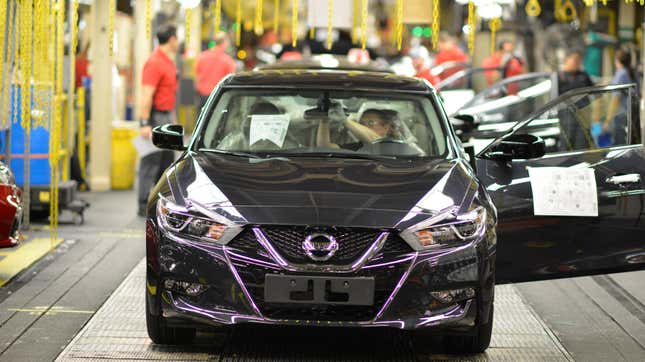
The wave of strikes against Detroit’s Big Three—Ford, General Motors, and Stellantis—has had a positive ripple effect on wages across the US auto industry.
Less than a month after the United Auto Workers (UAW) union reached tentative agreements with the legacy carmakers and called off the massive strikes, Nissan has announced that its 9,000 US factory workers, including production, maintenance, and tool-and-die technicians, will get a 10% raise as of next January. The Japanese automaker will also eliminate its tiered pay structure in the US, it said yesterday (Nov. 20).
“These changes are rooted in our ongoing strategy to attract and retain top talent within the industry,” Brian Brockman, a Nissan spokesperson, told Bloomberg.
Besides Nissan, several other non-union automakers—largely foreign, and mostly Japanese—have announced US pay raises to stay competitive and keep workers content. They probably aren’t doing it out of the “kindness of their hearts,” though, as UAW president Shawn Fain noted. Industry experts see it as a bid to dismantle labor—and union—power as calls to organize gain traction.
On Nov. 11, the UAW posted on X that “thousands of non-union autoworkers have reached out to join our union” in the past 90 days, and invited non-union autoworkers “at Toyota, Honda, Hyundai, Tesla, Nissan, BMW, Mercedes, Subaru, Volkswagen, Mazda, Rivian, or any other automaker” to organize. The post called on workers to “Stand Up and fight for themselves,” adding that “a better life is out there. It’s up to you to take action.”
A brief timeline of non-union automakers raising wages
Oct. 31: Toyota spokesperson Scott Vazin confirms to Axios that the company has boosted wages for employees at all of its US plants. Come January, the Aichi, Japan–headquartered manufacturer will raise factory worker pay by 9 to 10%.
Nov. 12: Honda, another Japanese carmaker, promises factory staff base wage increases of 11%, effective Jan. 8.
Nov. 13: South Korea’s Hyundai announces a 25% hikes in hourly wages by 2028 for production workers in Alabama and Georgia.
Nov. 16: Yet another Japanese automaker, Tokyo-based Subaru, is weighing wage increases at its only US manufacturing site in Indiana, CEO Atsushi Osaki says at the Los Angeles Auto Show. The extent of the hike hasn’t been established, but Subaru plans to align with the industry standard set by the new UAW-driven labor agreements.
Quotable: The UAW will organize more for 2028
“One of our biggest goals coming out of this historic contract victory is to organize like we’ve never organized before. When we return to the bargaining table in 2028, it won’t just be with a Big Three, but with a Big Five or Big Six.”
One more thing: Nissan vs. the UAW’s other contract terms
Nissan already offered eight weeks of paid parental leave—way more than the two weeks the UAW won in its new contracts—and recognized Juneteenth as a paid holiday.
But the Japanese automaker falls a little short on the time needed to reach top pay, which it previously cut from eight to four years. The UAW negotiated a better contract with the Big Three, shrinking the timeline for hitting maximum pay from eight to three years.